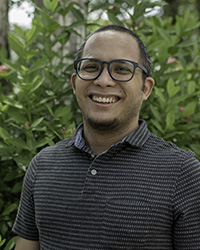Victor Hernandez Sang

Graduate Assistant and PhD Candidate, Latin American and Caribbean Studies Center
Research Expertise
Dominican Republic
Haitian Dominican Music and Religion
Immigration
Race
Racial discrimination
Víctor Hernández-Sang is a Ph.D. candidate in ethnomusicology. He completed his master’s degree at UMD with a thesis focused on the performance of Palos music in fiestas de misterios in the Dominican Republic and holds a B.A. in music from Luther College. His doctoral project examines discourses surrounding gagá (Haitian Dominican processional music and dance), racial discrimination and political organizing in the Dominican Republic through ethnographic, archival and online sources. In the summer of 2018, he received the Graduate School Summer Research Fellowship to start conducting field research for his dissertation. He was recently a fellow of the Latino Center at the Smithsonian Institution of the Latino Museum Studies Program. Hernández-Sang is the graduate assistant for the Latin American and Caribbean Studies Center in 2020-2023. Prior to UMD, he taught flute, ear training and English in his hometown of Santiago, Dominican Republic. Outside his doctoral research, he enjoys film and digital photography.
Publications
LACS GA Víctor Hernández-Sang presents paper at LASA
Hernández-Sang presented his paper entitled "Haitian Dominican Gagá in the Media and the Press" at the 2022 LASA Conference
Author/Lead: Victor Hernand…The paper analyzes the characterization of gagá and the Haitian Dominican community in the press and media, identifying two major talking points: 1) whether gagá is a Dominican tradition and 2) whether Vodou is a legitimate religion. Based on the examination of a variety of sources that include printed press since the 1970s, digital press and news media accessible online, and interviews with cultural brokers, Hernández-Sang traces the portrayal of the Haitian Dominican community by outsiders who use gagá and Vodou as objects to perpetuate ultranationalists and racist discourses. These voices that ascribe to anti-Haitian discourses take advantage of gagá and Vodou to scapegoat the Haitian Dominican community for the nation’s crises.

